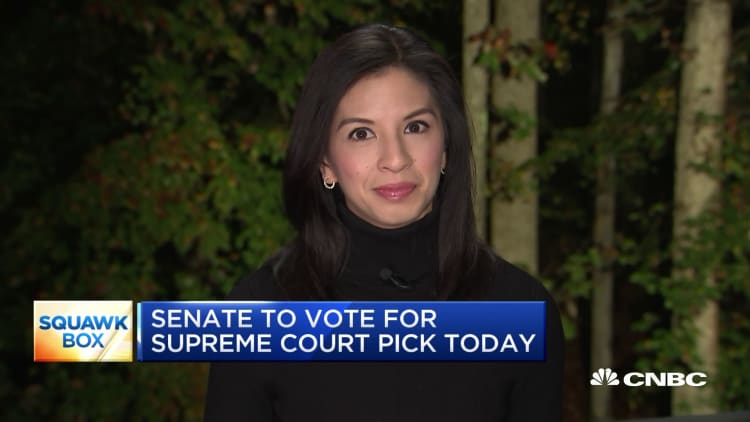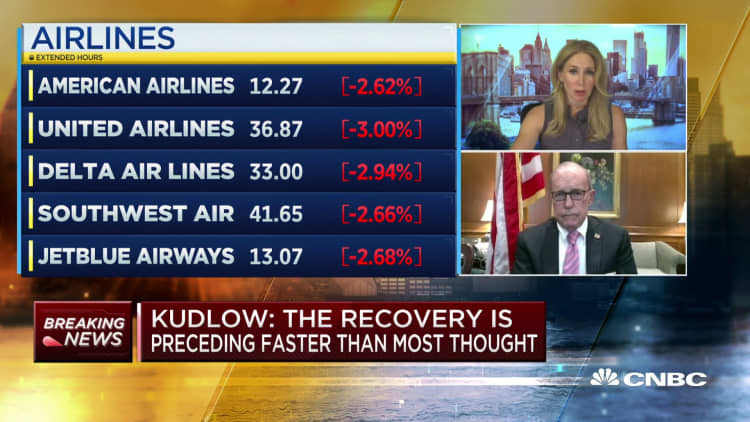When asked whether they want a second $1,200 stimulus check, most Americans will say yes.
But Washington lawmakers aren't so sure.
The fate of those payments and other additional coronavirus stimulus aid — namely additional enhanced federal unemployment benefits and loans for small businesses — has been up in the air since May.
Congress approved the first disbursement of $1,200 checks with the CARES Act that was passed in March. The payments were targeted at low- to middle-income individuals and families. Individuals and married couples who file jointly were eligible for up to $1,200 or $2,400, respectively, plus $500 per child under age 17.
The IRS and Treasury Department sent more than 160 million of those payments through direct deposit or mail in the following months.

A second round of $1,200 checks has at times seemed like a sure thing and, at other times, a long shot.
Here's why one week out from the Nov. 3 presidential election, there still are no clear answers.
May 15: House passes HEROES Act
In May, the House of Representatives passed a bill called the HEROES Act that called for more than $3 trillion in spending. The legislation included additional $1,200 stimulus checks.
This time, dependent checks would be raised to $1,200, for a maximum of $6,000 per family. The legislation also sought to expand eligibility for dependents over 17 and for people who do not hold U.S. citizen or resident alien status.
July 9: Capping eligibility at $40,000 in income?
Senate Majority Leader Mitch McConnell, R-Ky., said he would consider capping eligibility for a second stimulus check at $40,000 in income.
In response, Treasury Secretary Steven Mnuchin told CNBC, "We do support another round of economic impact payments. … The level and criteria we'll be discussing with the Senate."
July 27: Senate Republicans introduce bill with $1,200 checks
McConnell introduces a package of proposals, called the HEALS Act, that includes a second round of stimulus payments.
The proposal calls for payments similar to the first round, with $1,200 per individual or $2,400 per married couple, plus $500 per dependent. This time, however, dependents over 17 would be eligible for the money.
In an interview, President Donald Trump said he wants the second stimulus payments to be more than $1,200.
July 30: GOP senators propose $1,000 stimulus checks
A group of Republican senators introduce a bill that calls for $1,000 stimulus checks for both adults and children. Under the proposal, a family of four could receive $4,000.
This time, all adult dependents would be eligible.
Leaders behind the bill were Sens. Bill Cassidy, R-La.; Steve Daines, R-Mont.; Mitt Romney, R-Utah; and Marco Rubio, R-Fla.
Aug. 13: Congress breaks without passing stimulus
Approval of a coronavirus stimulus bill looks to be weeks away as congressional leaders decamp to their home districts.
While Capitol Hill leaders couldn't reach an agreement on other issues, one thing they seemed to agree on was those $1,200 checks. But the impasse would dash the Treasury Department's hopes of getting more one-time payments to Americans in August.
Trump tweets his frustration, saying, "Democrats are holding this up!"
Sept. 10: Senate Republicans fail to move small aid bill
A Republican bill including about $500 billion in new aid fails to get the necessary votes to pass the Senate.
The proposal included enhanced unemployment benefits and more aid to small businesses. Notably, another round of stimulus checks was not in the bill.
Sept. 16: Trump says Democrats are holding up stimulus payments
President Trump tweets that the Democrats are "heartless" and "don't want to give stimulus payments to people who desperately need the money."
Sept. 30: Both parties still want more $1,200 checks
Second $1,200 stimulus checks that are "similar" to the first payments will be in the next coronavirus stimulus package, Mnuchin said in an interview.
Though both parties are in favor of sending more direct payments, other issues continue to drag on negotiations.
Oct. 1: House Democrats pass updated stimulus bill
House Democrats revise and pass an updated HEROES Act, bringing the total cost down by about $1 trillion in a bid to appeal to Republicans.
The proposal includes $1,200 stimulus checks, but with more generous terms than the first set. Dependents of all ages would be eligible for $500 payments.
Individuals with Taxpayer Identification Numbers also would qualify for checks, a change from the first payments, which required valid Social Security numbers.
Oct. 7: Trump proposes stand-alone legislation to send $1,200 checks
As negotiations fail to move forward, Trump proposes stand-alone legislation on areas lawmakers agree on.
That would include a bill for $1,200 checks. While Capitol Hill leaders generally agree on the idea of more one-time payments, they would have to find a compromise on other terms, such as whether to expand eligibility beyond U.S. citizens and resident aliens.
Trump's proposal marks a reversal of the president's call to discontinue stimulus negotiations until after the election. The idea of stand-alone legislation is rejected by Democrats.
Oct. 12: Negotiations at 'impasse'
The White House has come up with an offer for a bigger stimulus bill, per Trump's wishes.
The package includes stimulus checks of $1,200 per adult and $1,000 per child. It also includes $400 per week in enhanced federal unemployment insurance through the third week of January.
House Speaker Nancy Pelosi, D-Calif., said negotiations remain at an impasse until the White House agrees to address certain issues, namely Covid-19 testing, tracing and treatment.

Oct. 21: $500 billion GOP Senate bill fails
Senate Republicans put forward a $500 billion to provide aid to Americans in certain areas, including $300 enhanced weekly federal unemployment benefits, more Paycheck Protection Program loans for small businesses and liability protections for businesses.
But the bill failed to get the 60 votes needed to pass the chamber.
Meanwhile, Pelosi and Mnuchin continued to hold discussions for a broader aid package. But the goal to have a deal in place by the end of the week did not pan out.
Oct. 26: White House backs 'targeted assistance'

"The talks have certainly slowed down, but they're not ending," Larry Kudlow, director of the National Economic Council, told CNBC in a Monday interview.
Additional aid is needed with regard to enhanced unemployment assistance, PPP small-business loans, and aid to schools and airlines, Kudlow said. He did not mention second stimulus checks.
"There are specific targeted areas," Kudlow said. "We don't need a gigantic ideological political bill here.
"What we need is some targeted assistance," he added. "... That would be a great help."
The Senate is expected to confirm Supreme Court nominee Amy Coney Barrett on Monday. After that, it is not scheduled to be back in session until after the election, dashing hopes for imminent additional aid.
How soon more federal help arrives may depend on the outcome of the Nov. 3 election.


